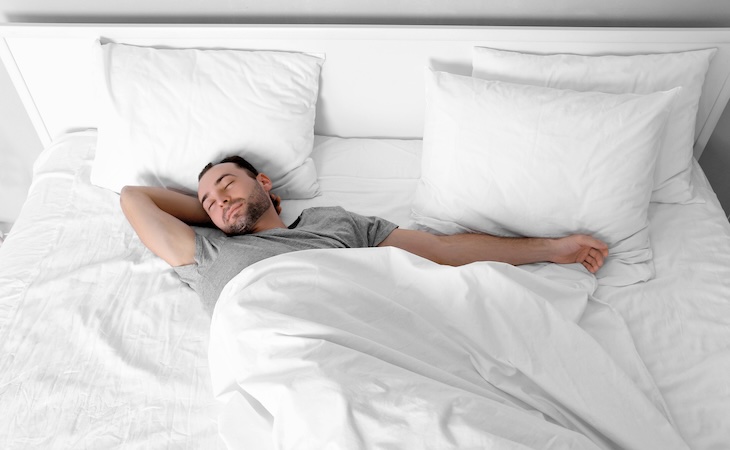Most of us invest time and money in the pursuit of a good night’s sleep because it’s essential to our overall health and wellness—and it feels amazing too. Most women, that is.
Studies show over 60% of men believe they’re naturally healthier than others and often skip annual check-ups and exams recommended for their age group.
This is alarming, as, according to the Centers for Disease Control and Prevention, half of all men over the age of 20 have high blood pressure, are of higher weights, and, on average, die five years earlier than women.
So, why do men skimp on a nighttime ritual and overlook the importance of sleep’s significant role in promoting good health?
Studies show over 60% of men believe they’re naturally healthier than others and often skip annual check-ups and exams recommended for their age group.
We spoke with four medical experts who shared their knowledge about the reasons, risk factors, and causes of poor sleep health in men and tips they can adopt to improve it.
Why men might not prioritize their sleep
Our culture often stereotypes men as deep sleepers and early risers and depicts naps as feminine. For example, fragile female fairytale characters suffer from insomnia and hypersomnia.
Films and television highlight women’s morning and bedtime routines, unlike men, especially “successful” men, who seem to run on batteries and magically roll out of bed in a suit and tie, alert and rested.
“One significant factor could be societal expectations or cultural norms associating being busy or sleep-deprived with productivity and strength,” says Lizzie Benge, MD, sleep medicine physician at Brigham and Women’s Hospital. “Some men may associate prioritizing sleep with a lack of ambition, while others might overestimate their health and believe they can function optimally on minimal rest, ignoring the long-term consequences.”
Bottom line: Like going to the doctor, men are taught to tough out or dismiss sleep issues.
“Some men may associate prioritizing sleep with a lack of ambition, while others might overestimate their health and believe they can function optimally on minimal rest, ignoring the long-term consequences.”
-Lizzie Benge, MD, sleep medicine physician at Brigham and Women’s Hospital
Common sleep problems in men
The direct effects of men not getting enough shuteye go far beyond morning grumpiness, easily remedied by a caffeine jolt. Insomnia, sleep apnea, and back pain are some of the most common problems that arise from this.
Men may brush off night sweats as simply being “hot-blooded,” but, like women, it could be caused by hormonal changes.
Left untreated, Benge warns these conditions can lead to serious health issues: untreated sleep apnea can cause high blood pressure and heart disease, and insomnia can become chronic sleep deprivation, affecting men’s brain and mental health.
“By not giving sleep the attention it deserves, these issues compound, creating a vicious cycle of poor sleep and worsening health,” she says.
According to online search trends analyzed by Ben’s Natural Health, men seem increasingly concerned about health issues exacerbated by poor sleep hygiene.
Hormonal changes were the second (low testosterone), fifth (high testosterone), and tenth (high estrogen) most Googled health conditions by men, while night sweats and back pain took the eighth and ninth spots, respectively.

Sleep tips for men
“I wish I hadn’t slept so soundly,” said no one ever. So, how can men have sleep goals to improve their health and well-being, and what might their evening routine look like?
“A relaxing nighttime wind-down routine can promote healthy sleep,” suggests Mike McGrath, MD, board-certified psychiatrist and chief clinical officer at The Oasis Recovery. “This routine can include relaxing activities such as taking a warm shower, drinking a cup of decaffeinated tea, and listening to soothing music.”
He also recommends sticking to a consistent sleep schedule. Mindful meditation, reading a book, and adopting a skincare routine can signal men to slow down and care for themselves after hours.
A nightly skincare routine can do more than hydrate skin and prevent fine lines. Hannah Kopelman, MD, a dermatologist at DermOnDemand, shares her favorite tips.
“Warm water during cleansing can help relax facial muscles and prepare you for rest, and applying products can have a meditative quality, reducing stress levels,” she says. “Well-moisturized skin is less prone to irritation or itchiness, which can disrupt sleep. Pairing skincare with aromatherapy—using lavender-infused products, for example—can also create a more restful environment.”
Daniel Clark, PhD, clinical psychologist at Park West Psychiatry, notes that not getting quality rest can also negatively impact relationships and work performance. Awareness of these factors may help men reroute their thinking about sleep and prioritize a healthy bedtime routine.
FAQs
What causes a lack of sleep in men?
Our experts cited chronic stress and poor sleep hygiene, including not having a regular bedtime and screen time from cell phones, computers, and television while in bed, exercise, caffeine, and alcohol too close to bedtime as the most common sleep disruptors. “Medications and undiagnosed sleep disorders can cause significant sleep issues as well,” says McGrath.
Why would a man have trouble sleeping?
Additionally, physical and mental health concerns and lifestyle choices contribute to sleep problems in men. “Conditions like anxiety, depression, or substance use can interfere with the ability to maintain a consistent sleep schedule,” says Benge. “A lack of exercise can also play a role in sleep deprivation.”
Trouble snoozing? Here are the most effective ways to fall asleep fast.




